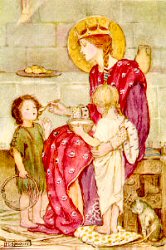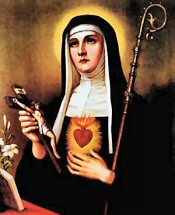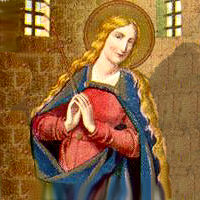Ordinary Time: November 16th
Optional Memorials of St. Margaret of Scotland; St. Gertrude, virgin
» Enjoy our Liturgical Seasons series of e-books!
St. Margaret (c. 1045-1093) was the great-niece of St. Edward the Confessor. She was a Saxon princess, raised in Hungary in exile. Returning to England, she had to flee once again after the Battle of Hastings, to the court of Malcolm, the King of Scotland, whom she married shortly thereafter. She proved to be a model mother and exemplary queen who brought up her eight children in an atmosphere of great devotion and worked hard to improve the morality of her subjects.
St. Gertrude, a Benedictine nun of the monastery of Helfta, in Saxony, is one of the great mystics of the Middle Ages. She was favored by visions of our Savior and has left a marvelous account of them in a book which she called Revelations. St. Gertrude introduced the devotion to the Sacred Heart which, four centuries later, St. Margaret Mary spread throughout the Church. She died at the beginning of the thirteenth century.
According to the 1962 Missal of St. John XXIII the Extraordinary Form of the Roman Rite, June 10 is the feast day of St. Margaret of Scotland.
St. Margaret of Scotland
 She was born in Hungary (1046), where her father was living in exile, and likewise spent her childhood there as an unusually devout and pious girl. In the course of time she went to England, when her father was called to high office in his fatherland by his uncle, King St. Edward III. Fortune, however, soon reversed itself again (Margaret's father died suddenly in 1057), and upon leaving England a mighty storm — or better, divine Providence — brought her to the shores of Scotland. Upon instructions from her mother, Margaret married Malcolm III, king of Scotland, in 1069. The country was blessed by her holy life and by her deeds of charity for the next thirty years. Her eight children she zealously trained in the practice of Christian virtues.
She was born in Hungary (1046), where her father was living in exile, and likewise spent her childhood there as an unusually devout and pious girl. In the course of time she went to England, when her father was called to high office in his fatherland by his uncle, King St. Edward III. Fortune, however, soon reversed itself again (Margaret's father died suddenly in 1057), and upon leaving England a mighty storm — or better, divine Providence — brought her to the shores of Scotland. Upon instructions from her mother, Margaret married Malcolm III, king of Scotland, in 1069. The country was blessed by her holy life and by her deeds of charity for the next thirty years. Her eight children she zealously trained in the practice of Christian virtues.
In the midst of royal splendor Margaret chastised her flesh by mortification and vigils and passed the greater part of the night in devout prayer. Her most remarkable virtue was love of neighbor, particularly love toward the poor. Her alms supported countless unfortunates; daily she provided food for three hundred and shared in the work of serving them personally, washing their feet and kissing their wounds.
—Excerpted from the Roman Breviary
Queen Margaret of Scotland is the secondary patroness of Scotland. Margaret's copy of the Gospels is preserved in the Bodleian Library at Oxford University.
Patronage: against the death of children; for learning; parents of large families; queens; widows; Dunfermline, Scotland; Scotland
Symbols and Representation: Black cross; scepter and book; hospital.
Often portrayed as: queen, often carrying a black cross, dispensing gifts to the poor.
Highlights and Things to Do:
- Read more about this wonderful wife and mother:
- Give special attention to the virtue of charity today by performing some service for the poor, i.e., send alms, buy baby items for a local crisis pregnancy center, or take a food donation to a food pantry.
- Offer your support (even if it is just a little morale) to a mother with young children who is trying to raise her children to love God.
- See CatholicSaints.info for links to read more about St. Margaret.
- If you are a mother and need a little boost, read Cardinal Mindszenty's book, The Mother.
- Today it might be fun to cook a pot of Scottish soup in honor of St. Margaret who probably cooked many pots of soup herself. Or see Catholic Cuisine for other food ideas.
- For nameday celebrations of St. Margaret, a crown cake, denoting her rank would be appropriate; a book cake would recall the love she had for Sacred Scripture. Chocolate "coins" wrapped in gold foil could be distributed to guests in memory of her generosity.
- The the bulk of her relics were destroyed in stages during the Protestant Reformation and the French Revolution. See Wikipedia for some details.
St. Gertrude
 St. Gertrude the Great, a Cistercian nun, is one of the most lovable German saints from medieval times, and through her writings she will remain for all ages a guide to the interior life. She was born in 1256 at Eisleben and at the age of five taken to the convent at Rossdorf, where Gertrude of Hackeborn was abbess. Similarity in name has often occasioned confusion between the two Gertrudes. Our St. Gertrude never functioned as superior.
St. Gertrude the Great, a Cistercian nun, is one of the most lovable German saints from medieval times, and through her writings she will remain for all ages a guide to the interior life. She was born in 1256 at Eisleben and at the age of five taken to the convent at Rossdorf, where Gertrude of Hackeborn was abbess. Similarity in name has often occasioned confusion between the two Gertrudes. Our St. Gertrude never functioned as superior.
In spite of much ill-health, Gertrude used her exceptional natural talents well, knew Latin fluently. When she was twenty-five years old (1281), Christ began to appear to her and to disclose to her the secrets of mystical union. Obeying a divine wish, she put into writing the favors of grace bestowed upon her. Her most important work, Legatus Divinae Pietatis, "The Herald of Divine Love," is distinguished for theological profundity, sublime poetry, and unusual clarity. How it stimulates love of God can be felt only by reading it; Abbot Blosius is said to have read it twelve times each year. St. Gertrude died in 1302, more consumed by the fire of God's love than by fever.
—Excerpted from The Church's Year of Grace, Pius Parsch
Patronage: nuns; travelers; diocese of Magdeburg, Germany; Naples, Italy; West Indies
Symbols and Representation: Crown; lily; taper; seven rings; heart with IHS; heart.
Highlights and Things to Do:
- Learn more about St. Gertrude:
- Read The Life and Revelations of St. Gertrude the Great.
- Pray the Novena of the Sacred Heart and the Litany of St. Gertrude.
- Catholic Cuisine suggests lily sandwiches for this feast day.






